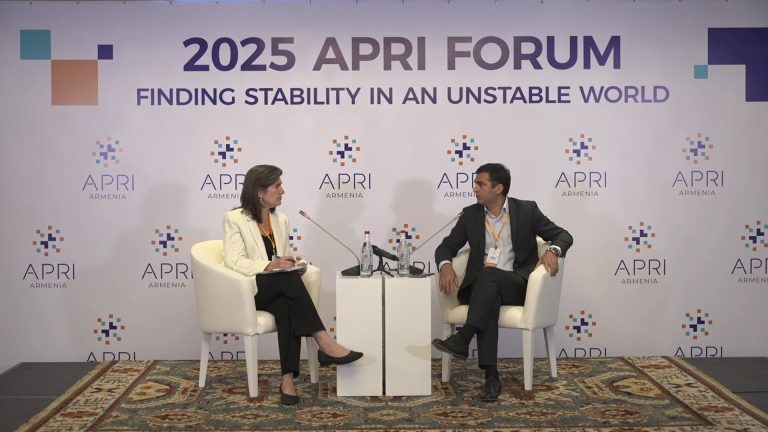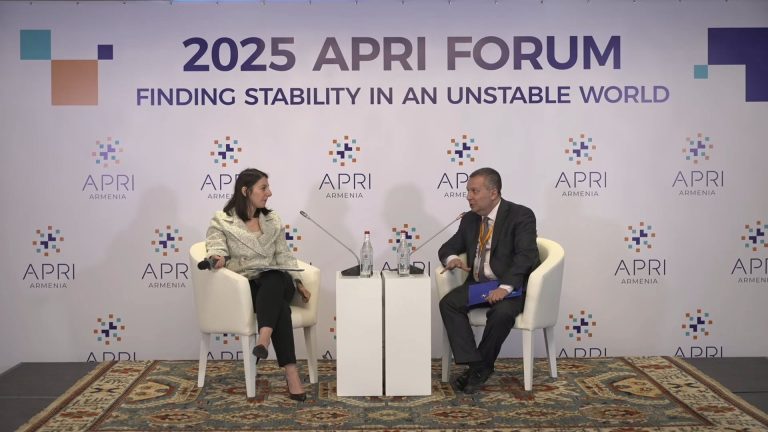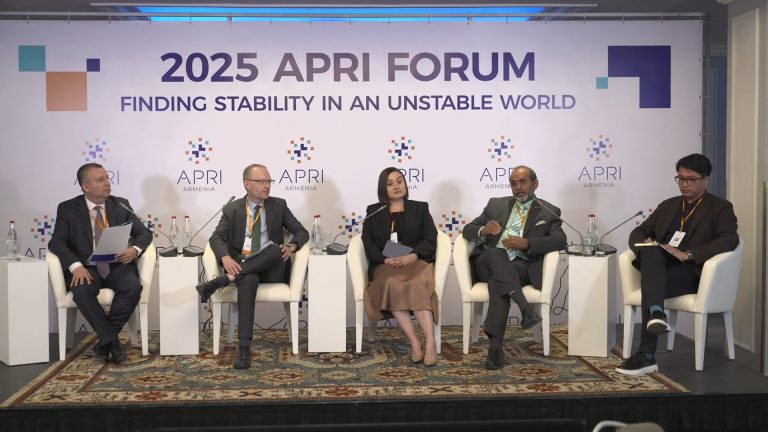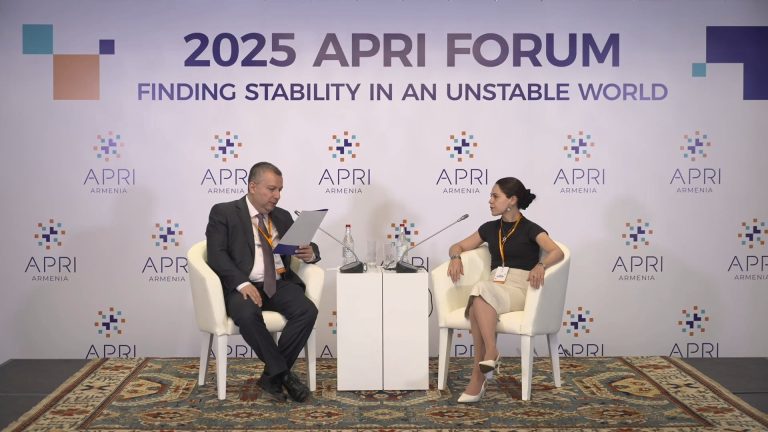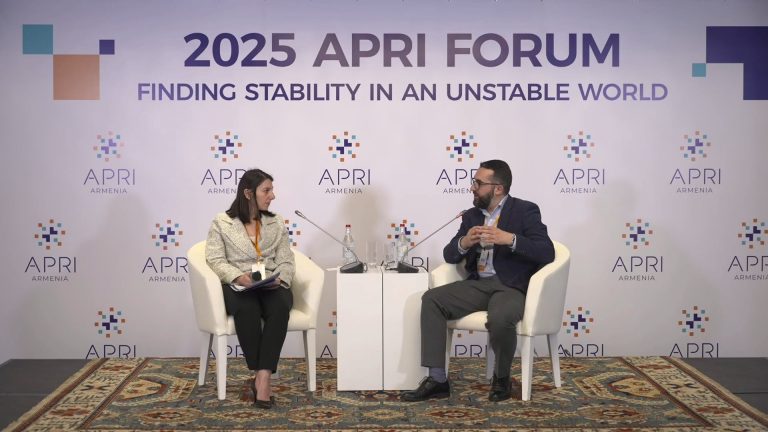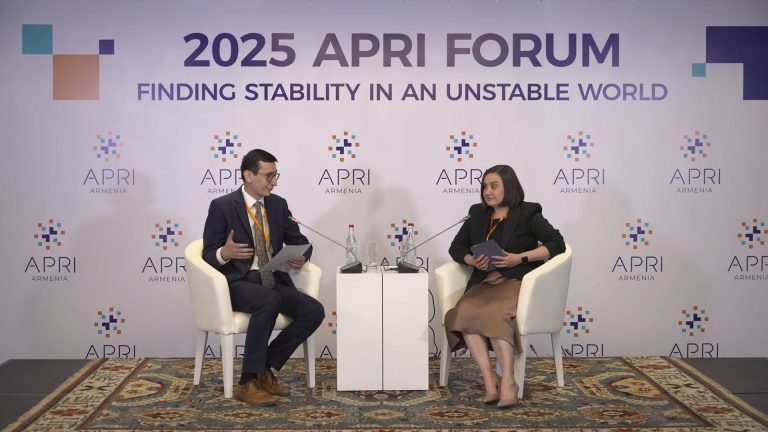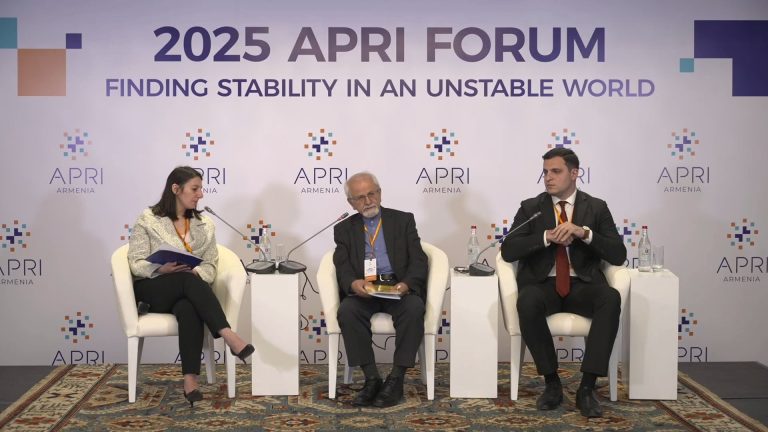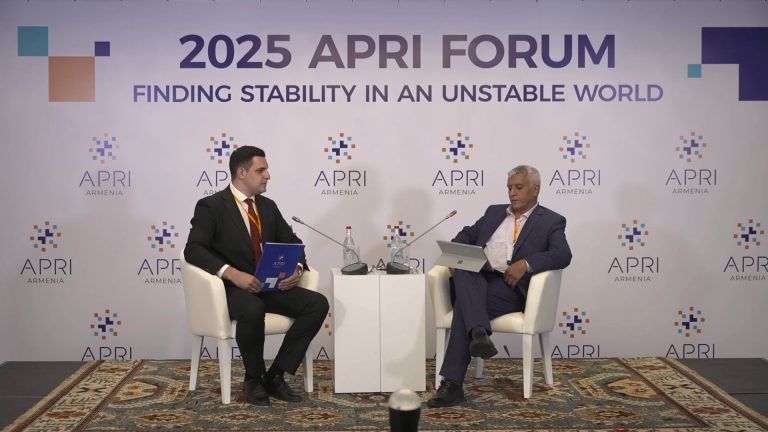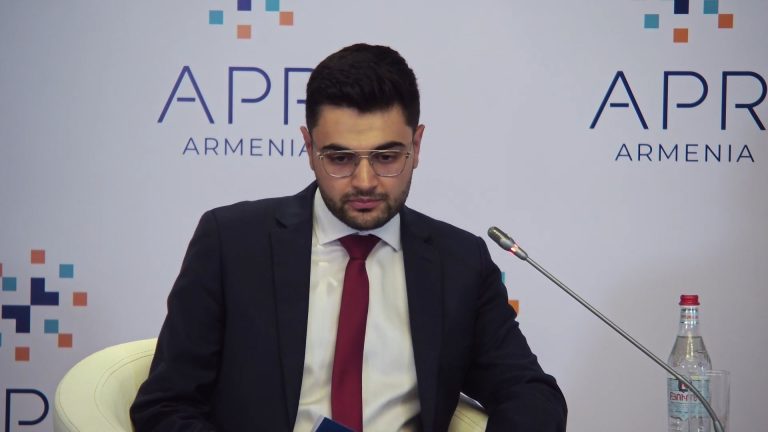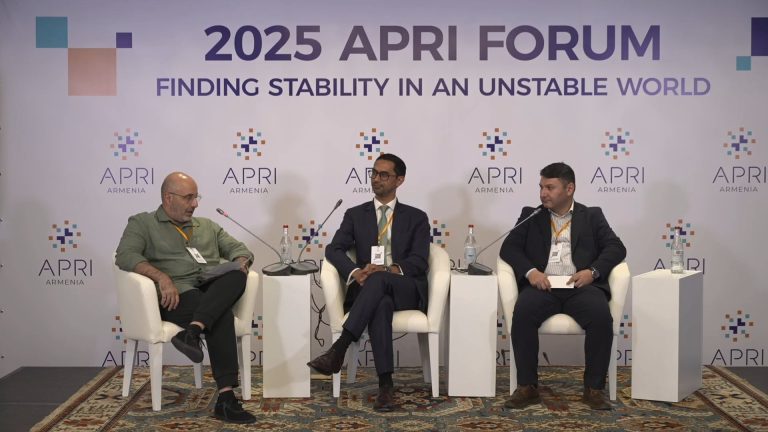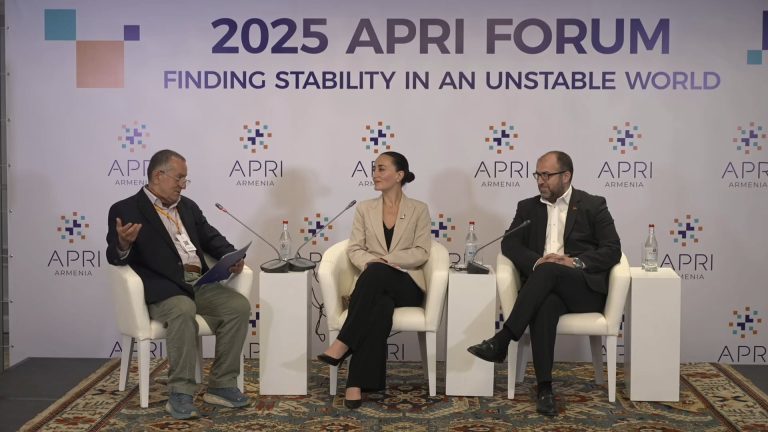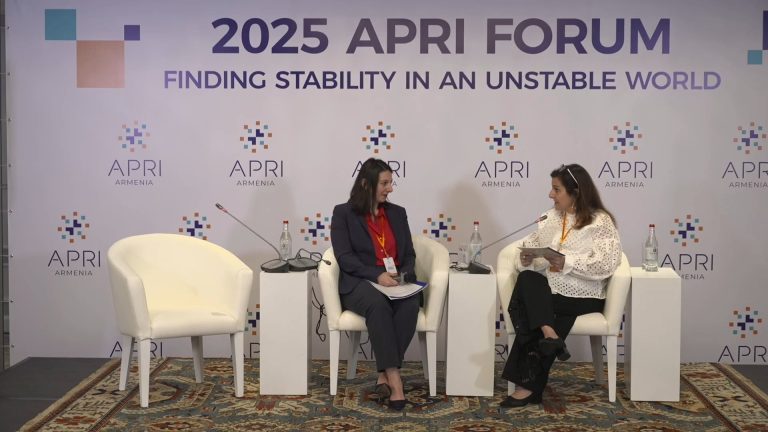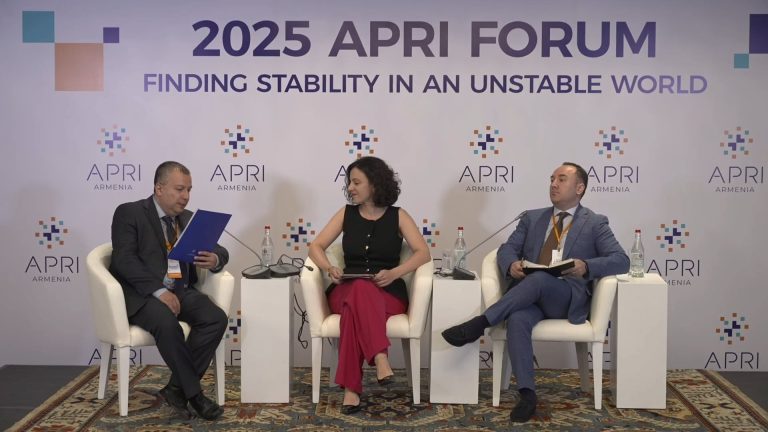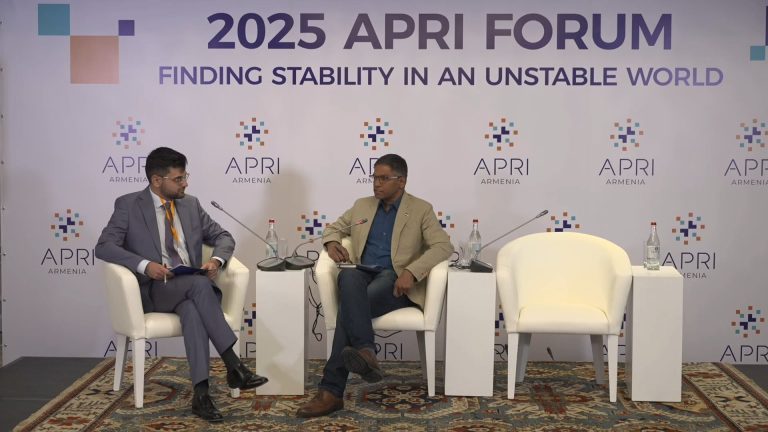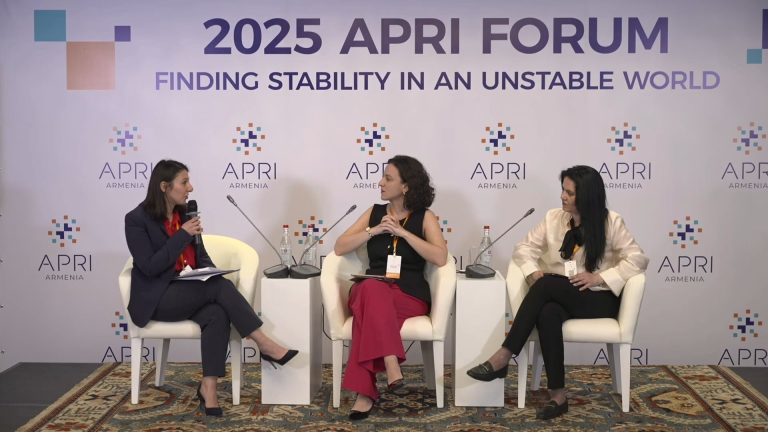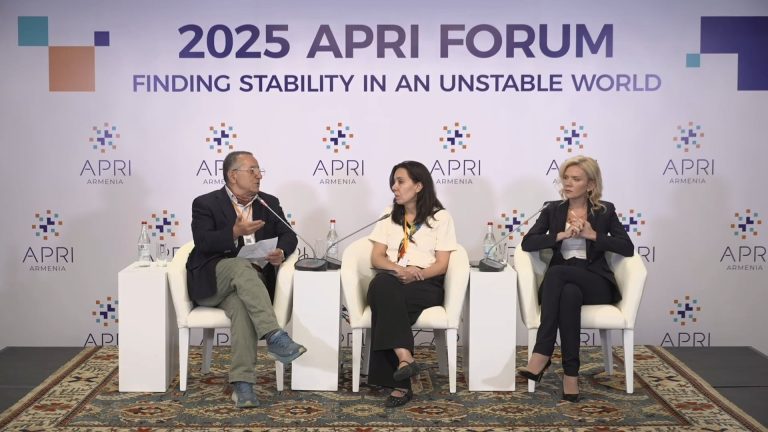Yerevan, Armenia
- June 11-13, 2025
The 2025 APRI Forum, with the theme “Finding Stability in an Unstable World,” took place June 11–13 in Yerevan. It offered in-depth and thought-provoking conversations on the global uncertainties shaping Armenia and the South Caucasus.
With ongoing conflicts in Ukraine and the Middle East, the political metamorphosis under the Trump administration, and persistent instability, the Forum provided a place to think through and discuss these challenges and how to navigate them.
The three-day conference brought together policymakers, diplomats, business leaders, civil society representatives, and engaged Armenians to address a range of critical issues—from fostering technology and investments and advancing energy security to navigating shifting geopolitics and strengthening civic engagement. Thought leaders from various fields debated over actionable recommendations to confront Armenia’s challenges in an increasingly volatile world.
Quotes that inspired us:
“As you start to walk on the way, the way appears.” Rumi
“Every great dream begins with a dreamer. Always remember, you have within you the strength, the patience, and the passion to reach for the stars to change the world.” Harriet Tubman
“I’m a pessimist because of intelligence, but an optimist because of will.” Antonio Gramsci, Letter from Prison, December 1929
Forum Agenda
9:25
Welcome and Opening Remarks
- Lara Setrakian, President, APRI Armenia
9:30
Stability through Technology and Innovative Partnerships
In this opening session of the 2025 APRI Forum, Hakob Arshakyan, Vice President of the National Assembly, shares Armenia’s vision for finding stability in an unstable world through enhanced focus on technology and innovative partnerships.
- Hakob Arshakyan, Vice President, National Assembly of the Republic of Armenia
- Moderator: Arda Haratunian, Board Member, APRI Armenia, AGBU, AUA and Adjunct Professor, Queens College
10:00
APRI Armenia’s Foreign Policy Report: Diversification in the Post-Unipolar World
APRI Armenia’s foreign policy report traces Armenian foreign policy developments since the 2020 Nagorno-Karabakh War and examines the challenges in diversifying and deepening diplomatic, economic, and security relationships in the last four years. With the launch of this report, APRI Armenia provides an analysis of Armenia’s foreign policy diversification and offers recommendations on how the next phase can address ongoing geopolitical uncertainties.
- Benyamin Poghosyan, Senior Research Fellow, APRI Armenia
- Moderator: Anahide Pilibossian, Vice President, Strategy and Development, APRI Armenia
10:15
Decoding the Global (Dis)Order
From wars in Ukraine, the Middle East, and other regions to a shattered global trade system, uncertainty is worsening. This session will focus on growing instability in the global order and how different and sometimes competing powers are responding to these changes.
- Iskander Akylbayev, Chief Executive Officer, Xander Group
- Alok Bansal, Director, India Foundation
- Evgeniya Goryushina, Researcher at the Centre for Comprehensive European and International Studies (CCEIS), HSE / Head of the Caucasus Studies Sector (ICCA RAS)
- Stefan Meister, Head of the Center for Order and Governance in Eastern Europe, Russia, and Central Asia, German Council on Foreign Relations, DGAP
- Moderator: Benyamin Poghosyan, Senior Research Fellow, APRI Armenia
11:00
Coffee Break
11:30
Armenia–Azerbaijan Negotiations: Prospects for Progress
Peace remains Yerevan’s top priority after the turbulence of recent years but the outstretched hand has often been met with a closed fist. Few signs suggest progress will be made toward a peace agreement with Azerbaijan this year—even as Armenia builds on its policy of constructive engagement while boosting deterrence. In conversation with Armenian experts, Rusif Huseynov, from the Topchubashov Center, presents the view from Azerbaijan on prospects for negotiations and regional peace. How will Baku respond and does it see any reason to make peace? Is no peace/no war the best the region can expect in the short- to mid-term perspective?
- Tatevik Hayrapetyan, PhD in History, Expert in Azerbaijani Studies
- Rusif Huseynov, Co-Founder and Director, Topchubashov Center (Zoom)
- Moderator: Benyamin Poghosyan, Senior Research Fellow, APRI Armenia
12:15
Armenia–Turkey Normalization and the Quest for Regional Stability
Despite high-level announcements, the Armenia–Turkey normalization process is at a standstill. Turkish President Recep Tayyip Erdoğan links normalization with Ankara to the signing of a peace agreement between Armenia and Azerbaijan, leading to a seeming deadend. What is behind this and are there any prospects for change? How might a less Azerbaijan-focused Turkish foreign policy impact the region? Can external actors, including Europe, Russia, the United States, and Iran, provide effective support for Armenia–Turkey normalization?
- Mitat Çelikpala, Vice-Rector, Kadir Has University (Zoom)
- Varuzhan Geghamyan, Associate Professor, Chair of Turkic Studies, Yerevan State University
- Moderator: Anahide Pilibossian, Vice President, Strategy and Development, APRI Armenia
13:00
14:00
Russia’s Foreign Policy and Russia–Armenia Dynamics
Diplomatic relations between Yerevan and Moscow have intensified since mid-2024, while the economic relation remains strong. The need for a reset is now discussed between the two. How might Armenia and Russia capitalize on this moment? What are their mutual expectations? What role will Armenia, and the South Caucasus, take in Russia’s foreign policy? How will Armenia’s foreign policy diversification affect the Armenia–Russia relationship?
- Evgeniya Goryushina, Researcher at the Centre for Comprehensive European and International Studies (CCEIS), HSE / Head of the Caucasus Studies Sector (ICCA RAS)
- Moderator: Leonid Nersisyan, Senior Research Fellow, APRI Armenia
14:45
Prospects for Iran–Armenia Relations
Relations between Iran and Armenia are reaching a new level, with Iran a key partner for Armenia’s connectivity and security. Maintaining open trade with its neighbor is vital, as is Iran’s opposition to Azerbaijani plans for the so-called “Zangezur Corridor.” However, US pressure on Iran may intensify if the two sides cannot reach a new deal on nuclear restraints. In the wake of this uncertainty, how can Yerevan and Tehran continue to build upon their partnership? How does Iran view its foreign policy in the South Caucasus amid relations with regional and nonregional actors?
- Sergei Melkonian, Research Fellow, APRI Armenia
- Seyed Mohammad-Kazem Sajjadpour, Distinguished Senior Fellow, Institute for Political and International Studies
- Moderator: Anahide Pilibossian, Vice President, Strategy and Development, APRI Armenia
15:30
Understanding Europe’s Outlook on the South Caucasus
Trade and security tensions between Europe and the United States are heightening as European leaders look to develop their strategic autonomy. The European Union has been actively engaged in Armenia and the region since 2022 and the current state of both regional and Euro-Atlantic affairs provides a litmus test of Brussels’ foreign policy aspirations. What shape will Europe’s policy toward the region take as bilateral relations with each of the three South Caucasus nations continue to evolve?
- Stefan Meister, Head of the Center for Order and Governance in Eastern Europe, Russia, and Central Asia, German Council on Foreign Relations, DGAP
- Élie Tenenbaum, Director of the Security Studies Center, French Institute of International Relations (IFRI)
- Moderator: Anahide Pilibossian, Vice President, Strategy and Development, APRI Armenia
16:15
Coffee Break
16:45
Solving the Iran Equation: US–Iran Negotiations and Regional Peace
Washington and Tehran are talking seriously again, raising the possibility of a deal on Iran’s nuclear program and the possible lifting of sanctions. Although any agreement may be some way off, both sides appear to be more open than in years to finding a way out of the decades-old impasse. What are the real prospects for a reduction in tensions? What would a deal mean for the region? How could Armenia capitalize on reduced tensions and a growing, and open, Iranian economy?
- Trita Parsi, Executive Vice President, Quincy Institute (Zoom)
- Nabi Sonboli, Senior Expert, Institute for Political and International Studies
- Moderator: Sergei Melkonian, Research Fellow, APRI Armenia
17:15
Armenia’s Nuclear Future
Nuclear energy is central to Armenia’s energy needs, as the Metsamor Nuclear Power Plant (NPP) generates a third of the country’s electricity. With the Metsamor NPP due to be decommissioned in 2036, Russia and the United States are open to building the next reactor in Armenia—with China and South Korea also under consideration. The decision will include technical considerations around cost, safety, and energy production, as well as geopolitical matters. Areg Danagoulian is Associate Professor of Nuclear Science and Engineering at MIT, whose research focuses on nuclear security and on applications of nuclear physics to societal problems. He will discuss the current status of nuclear power, its global challenges, and its potential impact on Armenia’s energy security.
- Areg Danagoulian, Associate Professor, Massachusetts Institute of Technology (Zoom)
- Moderator: Davit Antonyan, Associate Fellow, APRI Armenia
17:45
Building Resilience through Economic Growth
Boosting economic resilience in Armenia should contribute to greater deterrence capabilities. After the intense short-term economic growth experienced in the past few years, how does Armenia capitalize on the moment to achieve long-term economic viability? This conversation will assess Armenia’s economic growth and strategies to develop a more sustainable, inclusive, and resilient economic future.
- Haykaz Fanyan, Director, Armenian Center for Socio-Economic Studies (ACSES)
- Umang Rawat, Resident Representative in Armenia, International Monetary Fund (IMF)
- Moderator: Tigran Jrbashyan, Partner, Director of Management Advisory Services, Ameria CJSC
9:30
A Prelude to COP17
Armenia will host the Conference of the Parties to the Convention on Biodiversity in 2026, providing an opportunity to highlight leadership in a key environmental arena. The 17th Biodiversity COP will focus on enhancing efforts to stop and reverse biodiversity loss by 2030, a critical deadline to ensure that the world does not overshoot planetary ecological limits. What must Armenia do to ensure success in hosting its largest global conference to date? How can it enhance its own efforts to preserve biodiversity, security, and human development? Is it ready to take the lead on ensuring vital progress at COP17? And finally, what kind of a deterrence role can COP17 play in regional stability?
- Irina Ghaplanyan, Senior Climate Change Specialist, World Bank
- Erik Grigoryan, Founder and CEO, “Environment Group”, Armenian Special Envoy on Debt-for-Climate negotiations
- Moderator: David Akopyan, Senior Advisor, Crisis Management and State Building, Board Member, APRI Armenia
10:00
Advancing Health for National Security
- Kim Hekimian, Visiting Senior Fellow, APRI Armenia
- Moderator: Anahide Pilibossian, Vice President, Strategy and Development, APRI Armenia
10:15
Rediscovering Georgia
The recent establishment of a strategic partnership between Georgia and Armenia has great potential for alignment on regional issues between two neighbors who have often overlooked one another. This conversation will focus on outlining Georgia’s foreign policy with the South Caucasus countries and external actors such as Russia, Europe, and China, and explore pathways for Georgia and Armenia to take their relationship forward. What more could be done to deepen economic and strategic ties to a key neighbor who plays a vital role in connecting Armenia to its major trading partners?
- Johnny G. Melikyan, Head of Department, International Relations Research Department, Information and Public Relations Center – Senior Fellow, ORBELI Research Analytical Center
- Ketevan Tsanava, Governance and Public Sector Reform Expert; Partner, Solution Alternatives International (SAI)
- Moderator: Benyamin Poghosyan, Senior Research Fellow, APRI Armenia
10:45
Global Lessons on Fast-tracking Foreign Direct Investment
In this conversation, noted economist Pranjal Sharma discusses his experience spanning technology, globalization, and inclusive growth, and shares key lessons on how to fast-track foreign direct investments and sustainable economic partnerships. What are the key variables of economic partnerships in the current global economic order? How can Armenia go about deepening strategic economic ties with new country partners such as India, the countries of the Gulf Cooperation Council, and Central Asia, and attracting key foreign investments?
- Pranjal Sharma, Author and Economic Analyst, Member World Economic Forum’s Expert Network
- Moderator: Davit Antonyan, Associate Fellow, APRI Armenia
11:00
Coffee Break
11:30
Stability in the Greater Middle East
The Middle East faces a series of intense immediate challenges: the geopolitical shifts prompted by Israel’s fight against Hamas, Hezbollah, and the Houthis; discussions between the United States and Iran over its nuclear program that can quickly escalate into tensions; and the change in regime in Syria. At the same time, this uncertainty may also paradoxically lead to a more stable Middle East, particularly if US–Iran negotiations bear fruit. Joined by panelists from across the Middle East, this discussion will assess the prospects for instability (and stability) in the Middle East and what forms this might take. What would be the implications for the wider region?
- Talar Kazanjian, Executive Director, Afeyan Initiatives for Armenia
- Joseph Kéchichian, Senior Fellow, King Faisal Center for Research and Islamic Studies (Zoom)
- Dan Perry, Partner, LPP, Publisher, Ask Questions Later (Substack), Former Chief Editor, Associated Press in Europe, Africa and the Middle East (Zoom)
- Moderator: David Akopyan, Senior Advisor, Crisis Management and State Building, Board Member, APRI Armenia
12:15
Understanding Armenia’s Human Capital Potential
The newly-released Country Partnership Framework from the World Bank outlines a five-year strategy aimed at reducing poverty and improving resilience across Armenia. It also has produced a compelling Armenia Human Capital Review in 2023, addressing the knowledge, skills, and health that Armenian society showcases. World Bank Representative Carolin Geginat will discuss the World Bank’s findings in both reports. What are the next steps to improve the health and education of all Armenians? What would be the most effective ways to meet the challenges of the 21st century?
- Carolin Geginat, Country Manager for Armenia, The World Bank
- Moderator: Arda Haratunian, Board Member, APRI Armenia, AGBU, AUA and Adjunct Professor, Queens College
12:45
Lessons Learned from Public Administration Reforms in Georgia and Armenia
Georgia and Armenia have taken steps to improve public administration in their countries. How far have improvements gone and what more is needed? What are the lessons from reforms so far in Georgia that may be relevant for Armenia?
- Lilya Afrikyan, Head of Participatory and Open Governance Department, Office of the Prime Minister of the Republic of Armenia
- Ketevan Tsanava, Governance & Public Sector Reform Expert, Partner Solution Alternatives International (SAI)
- Moderator: Anahide Pilibossian, Vice President, Strategy and Development, APRI Armenia
13:15
14:15
10 Years of Eurasian Economic Union: Lessons Learned
The Eurasian Economic Union (EAEU) brings together more than 180 million people with a GDP of more than $2 trillion but its first decade has been marked by geopolitical challenges and regional tensions. Sanctions on Russia have inhibited growth in the largest economy in the union while the recent free trade agreement signed between the EAEU and Iran, and potential ones with India and the United Arab Emirates, bolster Armenia’s—and the other members’—economic prosperity. This session will assess the impact of the past 10 years of the EAEU and underscore the key challenges that remain.
- Iskander Akylbayev, Chief Executive Officer, Xander Group
- Evgeniya Goryushina, Researcher at the Centre for Comprehensive European and International Studies (CCEIS), HSE / Head of the Caucasus Studies Sector (ICCA RAS)
- Hrant Mikaelian, Director, Armenian Research Institute
- Moderator: Hayk Margarian, Executive Board, Chair of Trade & Investment Commission, ICC Armenia, National Focal Point, United Nations Climate Technology Center and Network
15:00
Assessing China’s Interest in the South Caucasus
Reductions in trade with Europe through Russia and Ukraine due to the war between them has boosted Chinese interest in the South Caucasus as it looks more to the Middle Corridor, an increasingly important part of its Belt and Road Initiative. And while relations between China and Georgia and Azerbaijan have reached new heights, Armenia–China relations still have room for growth. How can we understand China’s interest in the South Caucasus? How might Chinese engagement in the region contribute to regional stability?
- Xu Wenhong, Deputy Secretary-General of the Center for One Belt One Road, Chinese Academy of Social Sciences (Zoom)
- Moderator: Benyamin Poghosyan, Senior Research Fellow, APRI Armenia
15:30
War Lessons for Small and Large States
Technology is changing warfare at an unprecedented speed, from the increased use of drones in all areas of defense to the use of artificial intelligence for targeting and autonomous weapons. But the lessons run deeper than the buzz of new technology. The war in Ukraine, ongoing conflict in Gaza, and other global conflicts have shown the importance of a trained and motivated defense force with adaptable command systems that empower those on the front line to make decisions. What are the key lessons—for both large and small states—of the past few years of war?
- Michael Kofman, Senior Fellow, Russia and Eurasia Program, Carnegie Endowment for International Peace (Zoom)
- Leonid Nersisyan, Senior Research Fellow, APRI Armenia
- Élie Tenenbaum, Director, Security Studies Center, French Institute of International Relations (Ifri)
- Marc De Vore, Senior Lecturer, University of St Andrews
- Moderator: Anahide Pilibossian, Vice President, Strategy and Development, APRI Armenia
16:15
Coffee Break
16:45
Addressing Vulnerabilities in Armenia’s Economic Growth
- Léa Hakim, Senior Country Economist for Armenia, The World Bank
- Moderator: Arda Haratunian, Board Member, APRI Armenia, AGBU, AUA and Adjunct Professor, Queens College
17:00
Connectivity, Corridors, and the Caucasus
- Iskander Akylbayev, Chief Executive Officer, Xander Group
- Stefan Meister, Head of the Center for Order and Governance in Eastern Europe, Russia, and Central Asia, German Council on Foreign Relations, DGAP
- Pranjal Sharma, Author and Economic Analyst, and Member of the World Economic Forum’s Expert Network
- Moderator: Benyamin Poghosyan, Senior Research Fellow, APRI Armenia
17:45
Politics and Prisoners in the Peace Process
- Jared Genser, Managing Director, Perseus Strategies
- Moderator: Siranush Sargsyan, Independent Journalist
9:30
Reengaging with Philosophy (Session in Armenian, Translation Provided)
Noted Armenian philosopher Ashot Voskanyan opens the final day of the 2025 APRI Forum by asking us to re-engage with ourselves, our Armenian character, and philosophy. What have the past few years of trials and tribulations revealed about our society and identity? How do we regroup from here, developing a national consciousness and unity based around a shared philosophy?
- Ashot Voskanyan, Adjunct Assistant Professor, American University of Armenia (AUA)
- Moderator: Anahide Pilibossian, Vice President, Strategy and Development, APRI Armenia
10:00
Journalism in Armenian Civic Debate (Session in Armenian, Translation Provided)
Journalism plays a vital role in shaping civic debate and informing participation. In Armenia’s dynamic and often polarized public sphere, the media has the potential to act as a platform for dialogue, critical reflection, and accountability. This session explores how journalism can support meaningful civic engagement by providing accurate, balanced, and high-quality reporting. The discussion will also highlight strategies for countering disinformation and building a media environment that encourages thoughtful debate rather than division.
- Edik Baghdasaryan, Head of Investigative Journalists of Armenia; Editor-in-Chief, Hetq newspaper
- Stella Mehrabekyan, Senior Editor, CivilNet.am
- Narine Nazaryan, Director, Armenpress News Agency
- Moderator: Greta Avetisyan, National Communications Lead, APRI Armenia
10:45
Turning Diasporas into Powerhouses
This panel discussion will discuss the role of diasporas for a country’s national development, taking the cases of India and Armenia. Panelists will also address issues of national ideals and how they shape motherland-diaspora ties.
- Abhinav Pandya, Founder and Chief Executive Officer, Usanas Foundation
- Mariam Khaloyan, Congressional Relations Director, Armenian Assembly of America
- Moderator: Nvard Chalikyan, Research Fellow, APRI Armenia
11:15
Coffee Break
11:45
Armenia’s National Security (Session in Armenian, Translation Provided)
- Armen Grigoryan, Secretary, National Security Council of Armenia
- Moderator: Anahide Pilibossian, Vice President, Strategy and Development, APRI Armenia
12:15
India’s Interests in the South Caucasus and India–Armenia Dynamics
The growth in India–Armenia relations are not only grounded in defense cooperation but also based on a shared geopolitical rationale. Recent tensions between India and Pakistan have shown the merits of this relationship as Armenia supported India while Turkey and Azerbaijan sided squarely with Pakistan. This session will discuss the common interests that India and Armenia share and the threats they face, while addressing the strategic importance of the South Caucasus for India’s foreign and security policy. What are India’s evolving foreign policy priorities in the South Caucasus? How has India re-evaluated its regional priorities following the Pahalgam attack and subsequent developments? What implications may Turkey’s regional ambitions and “Zangezur Corridor” project have for India?
- Alok Bansal, Director, India Foundation
- Varuzhan Geghamyan, Associate Professor, Chair of Turkic Studies, Yerevan State University
- Abhinav Pandya, Founder, Director and CEO, Usanas Foundation
- Moderator: Nvard Chalikyan, Research Fellow, APRI Armenia
13:00
14:00
Critical Minerals and Armenia’s Mining Future
Armenia has the potential to build upon its significant minerals sector with key deposits of copper, gold, and molybdenum. But mining poses challenges to all nations from often neglected environmental concerns to the risks of selling off national assets. As the world rushes to secure supplies of critical resources, particularly those involved in high technologies and the transition away from fossil fuels, how can a small state such as Armenia secure its interests and build its economy? What are the key advantages of Armenia’s mining sector, and what role can it play in its foreign relations?
- Artyom Geghamyan, Executive Chairman, International Chamber of Mines of Armenia
- Moderator: Davit Antonyan, Associate Fellow, APRI Armenia
14:30
How Small States can Navigate Global Trade Uncertainty
- Barret Kupelian, Chief Economist, PwC UK
- Moderator: Anahide Pilibossian, Vice President, Strategy and Development, APRI Armenia
15:00
Sustainable Development of Armenia’s Regions
This panel will discuss key initiatives that are shaping the sustainable development of Armenia’s regions—from infrastructure projects in Syunik and Vayots Dzor to tourism projects in Tavush and Gegharkunik. What role do foundations and for-profits play in driving the sustainable growth of Armenia’s regions, and bringing economic, tourism-linked, and social development to local populations? What are the main challenges and benefits of pursuing development projects in Armenia’s regions?
- Katerina Danekina, Chief Executive Officer, Green Rock
- Marina Mkhitaryan, Executive Director, AGBU Armenia
- Moderator: David Akopyan, Senior Advisor, Crisis Management and State Building, Board Member, APRI Armenia
15:30
Finding Stability in an Unstable World
- Roberta Ervine, Professor of Armenian Studies St. Nersess Armenian Seminary (Zoom)
- Moderator: Lara Setrakian, President, APRI Armenia (Zoom)
15:45
Closing Words
- Anahide Pilibossian, Vice President, Strategy and Development, APRI Armenia
Speakers
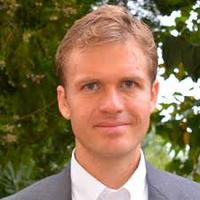



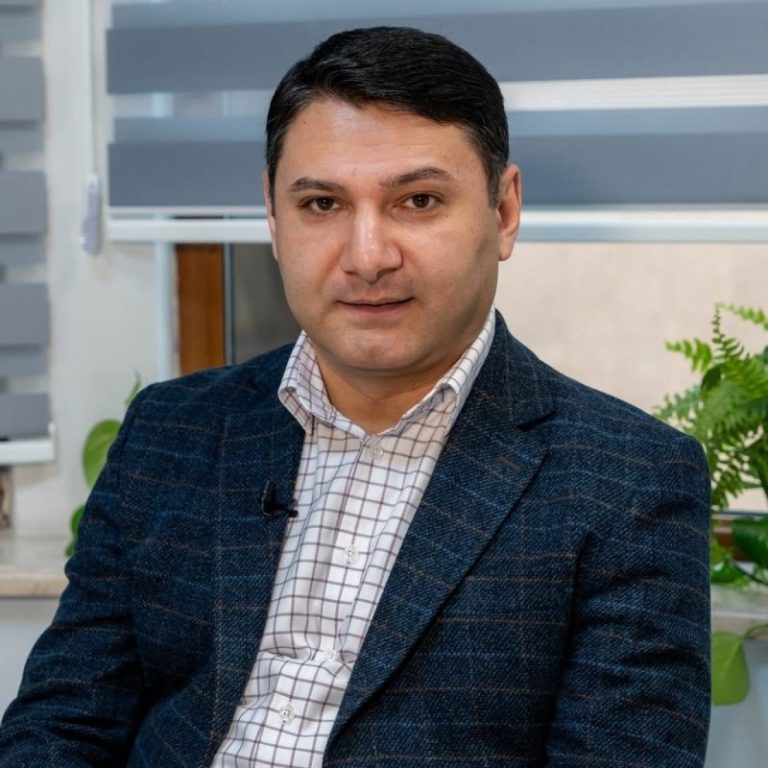
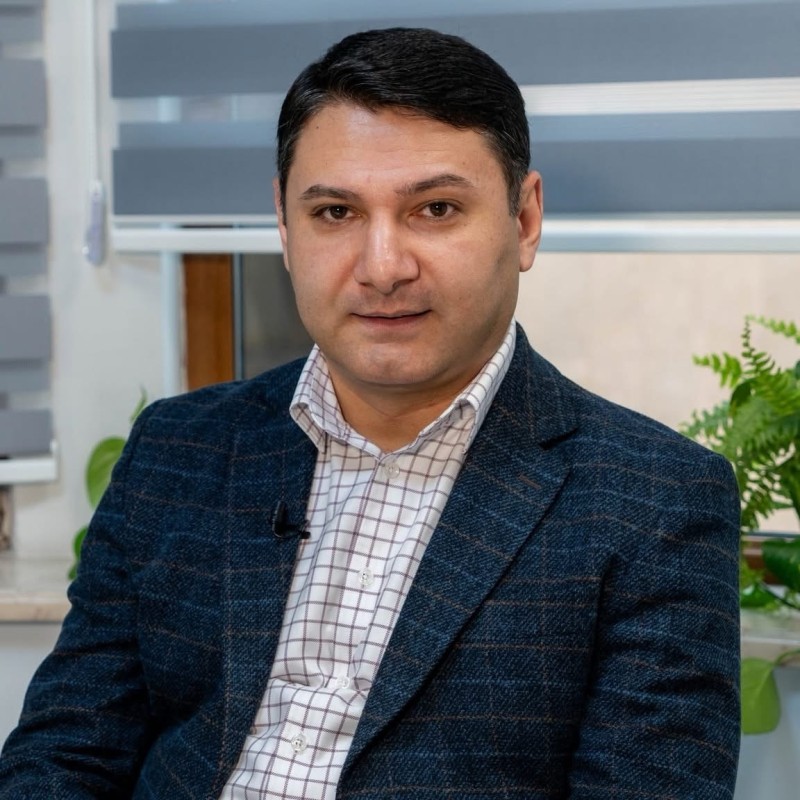
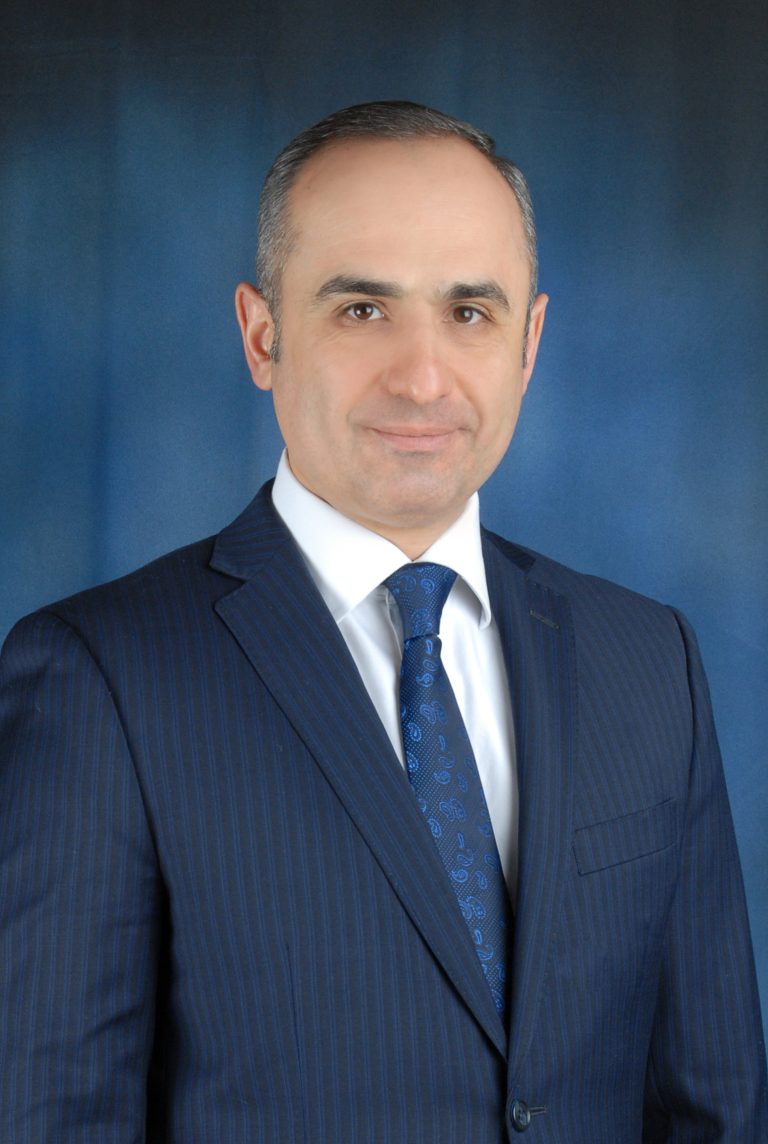
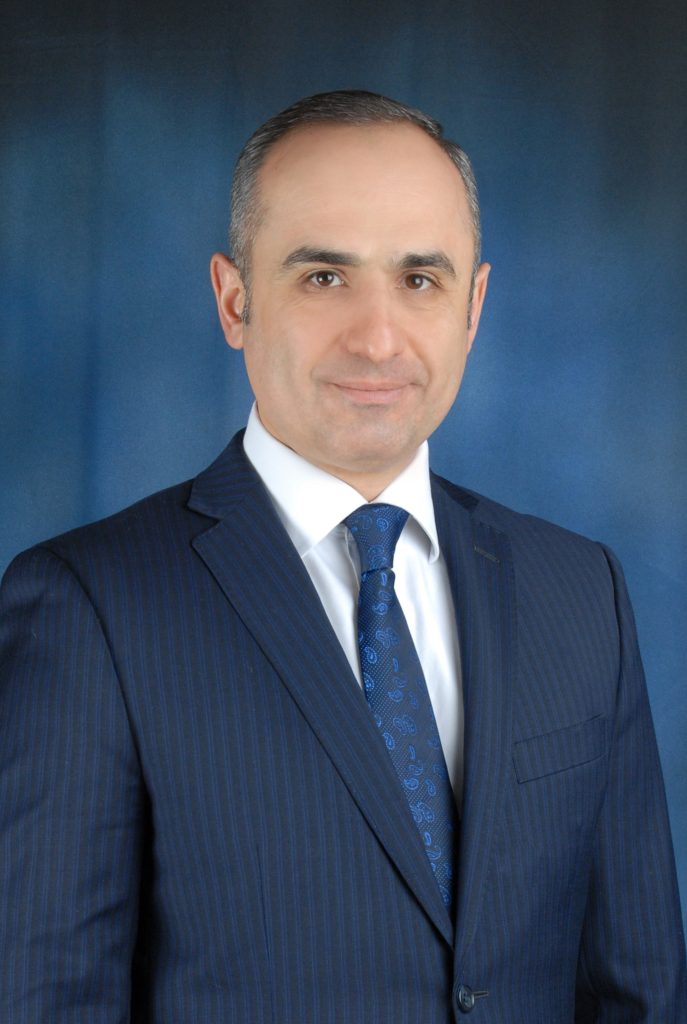
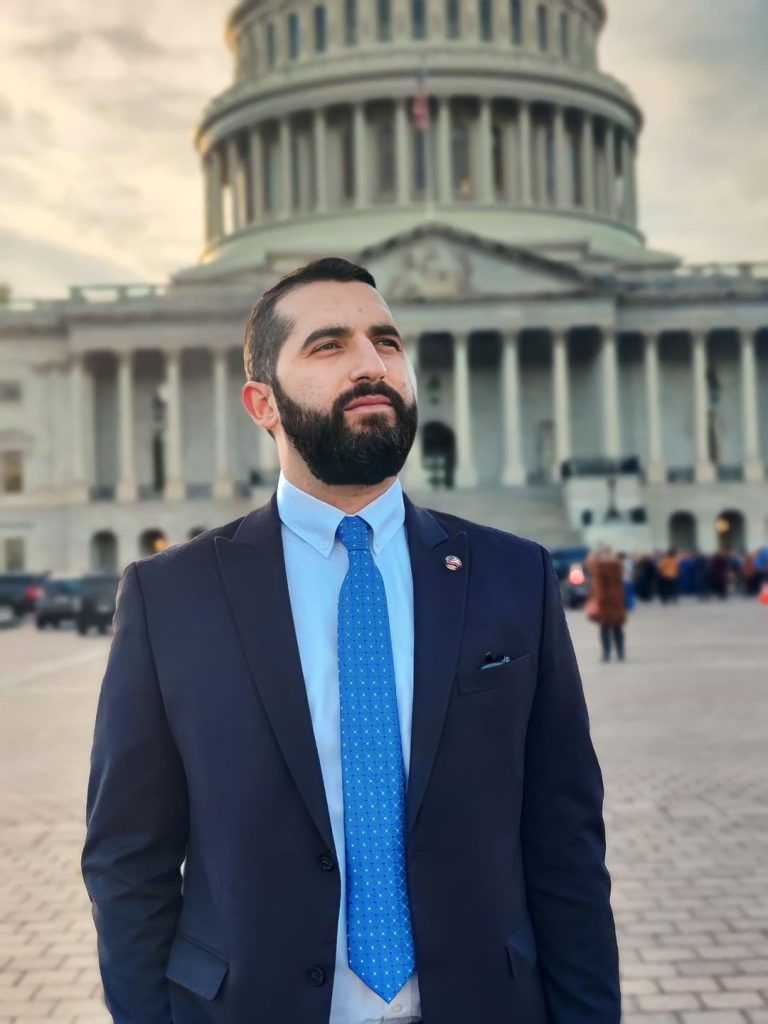

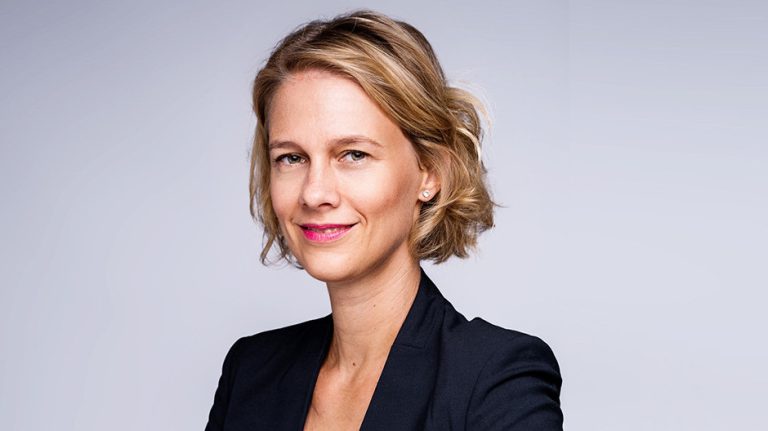
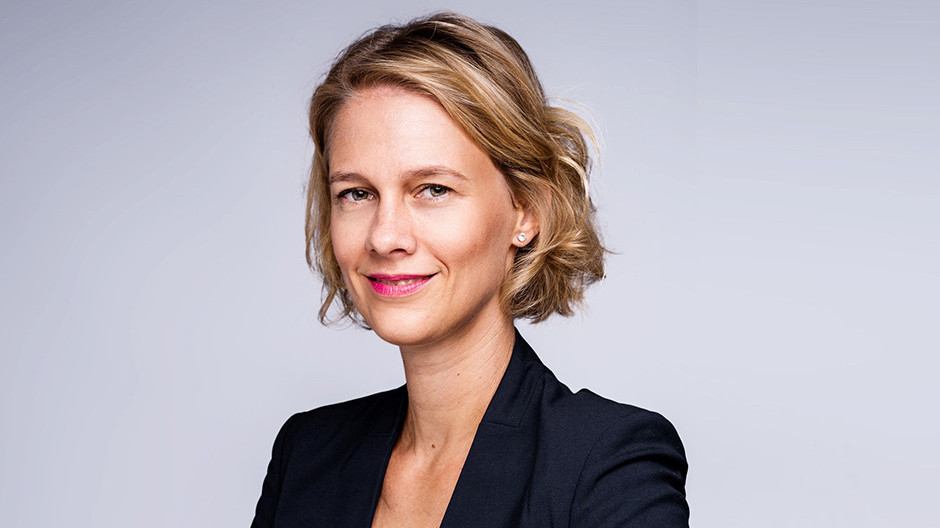
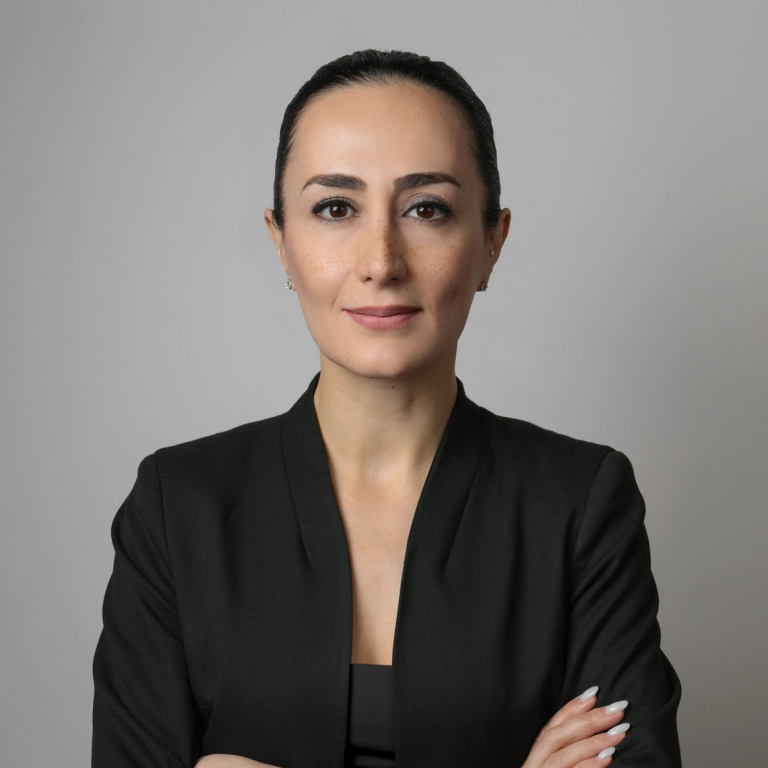
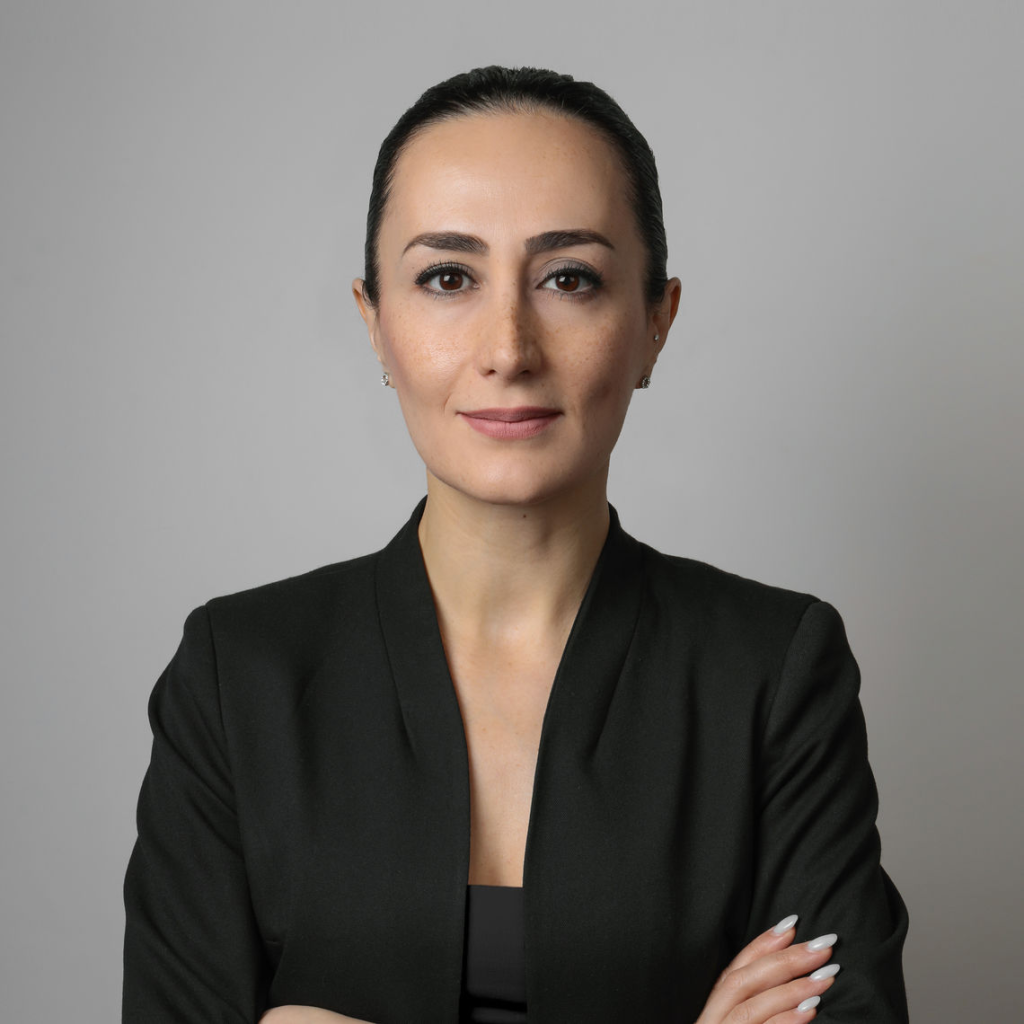
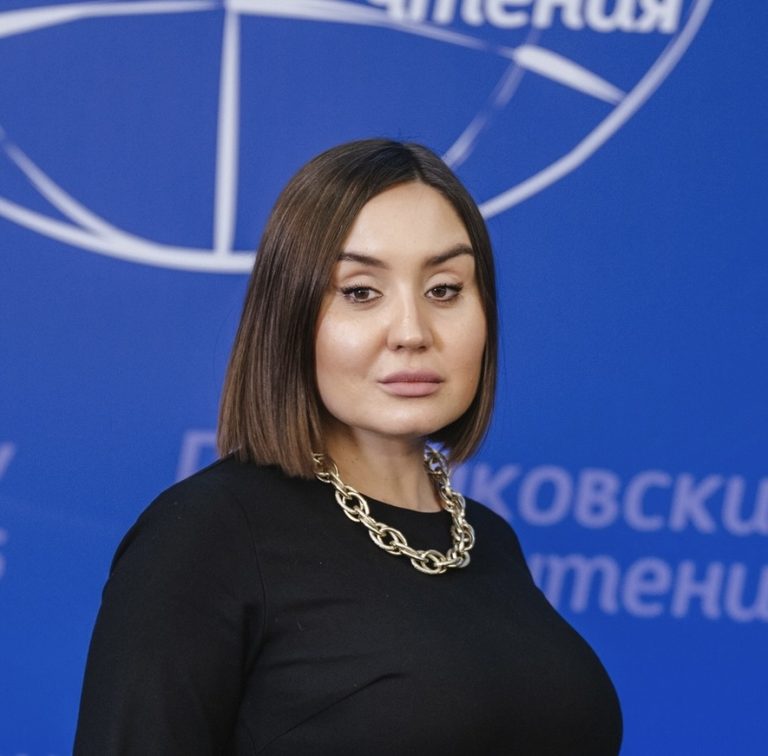
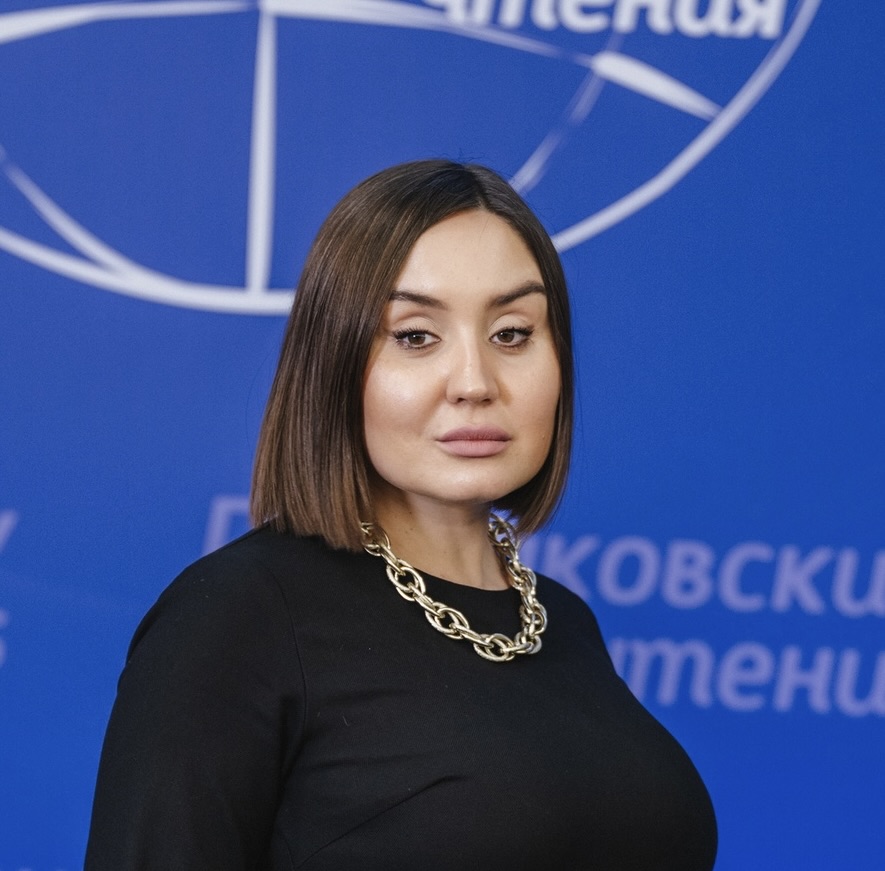



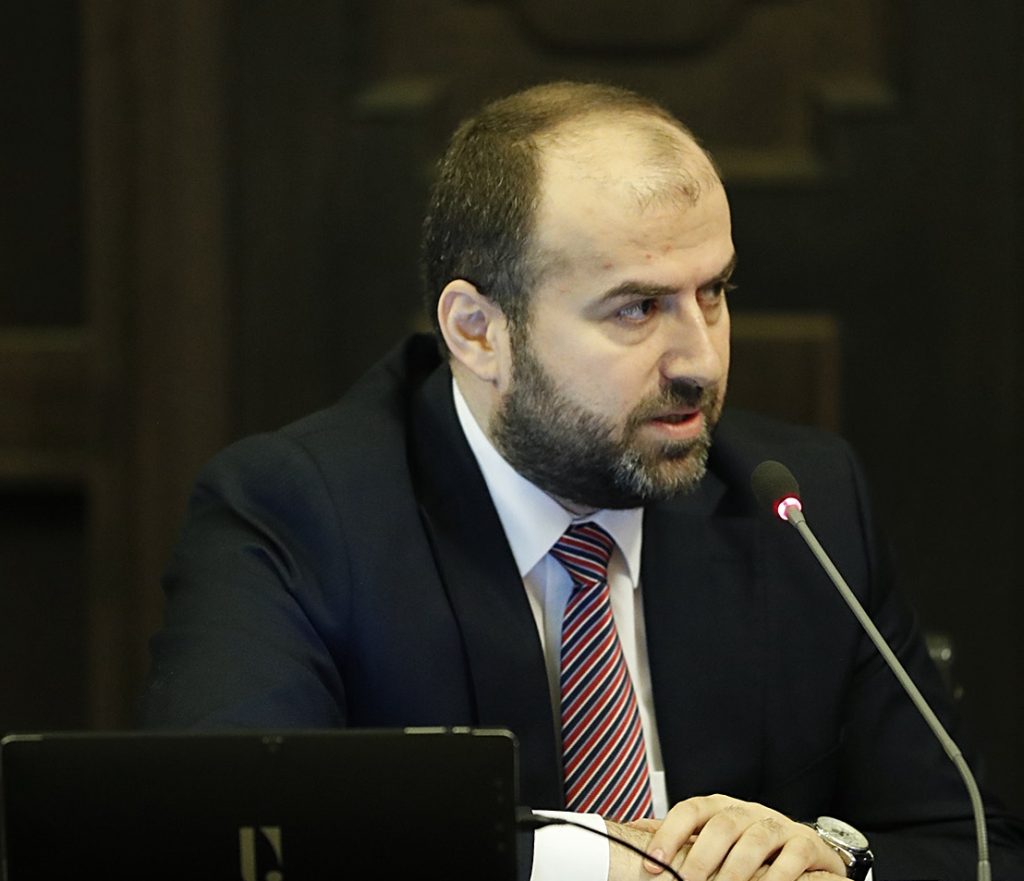
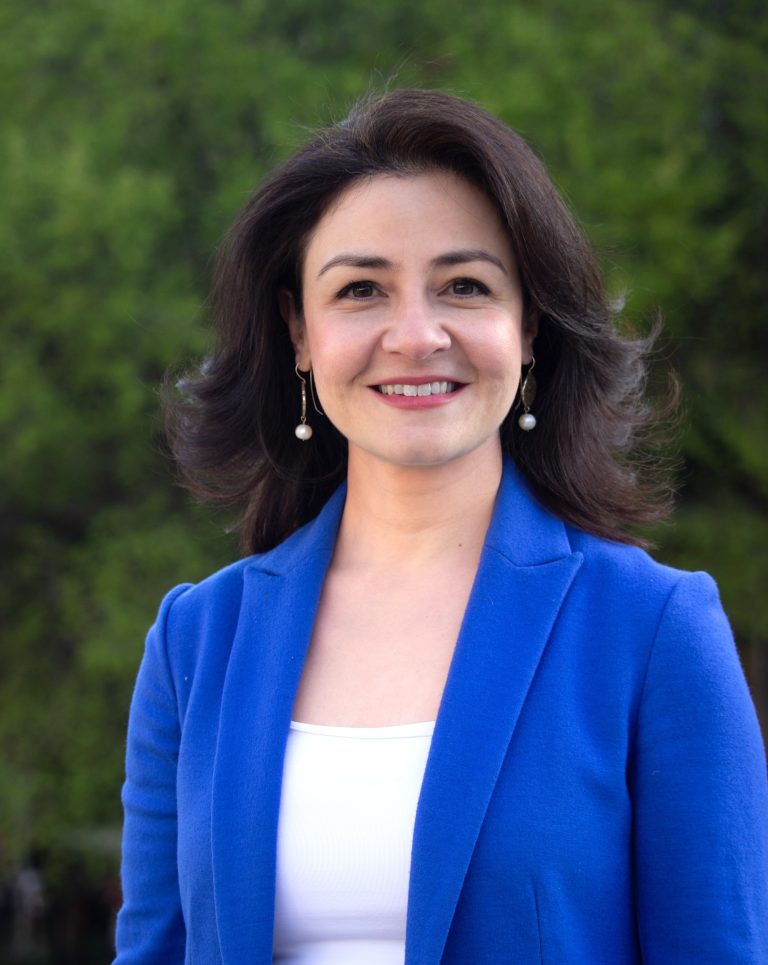
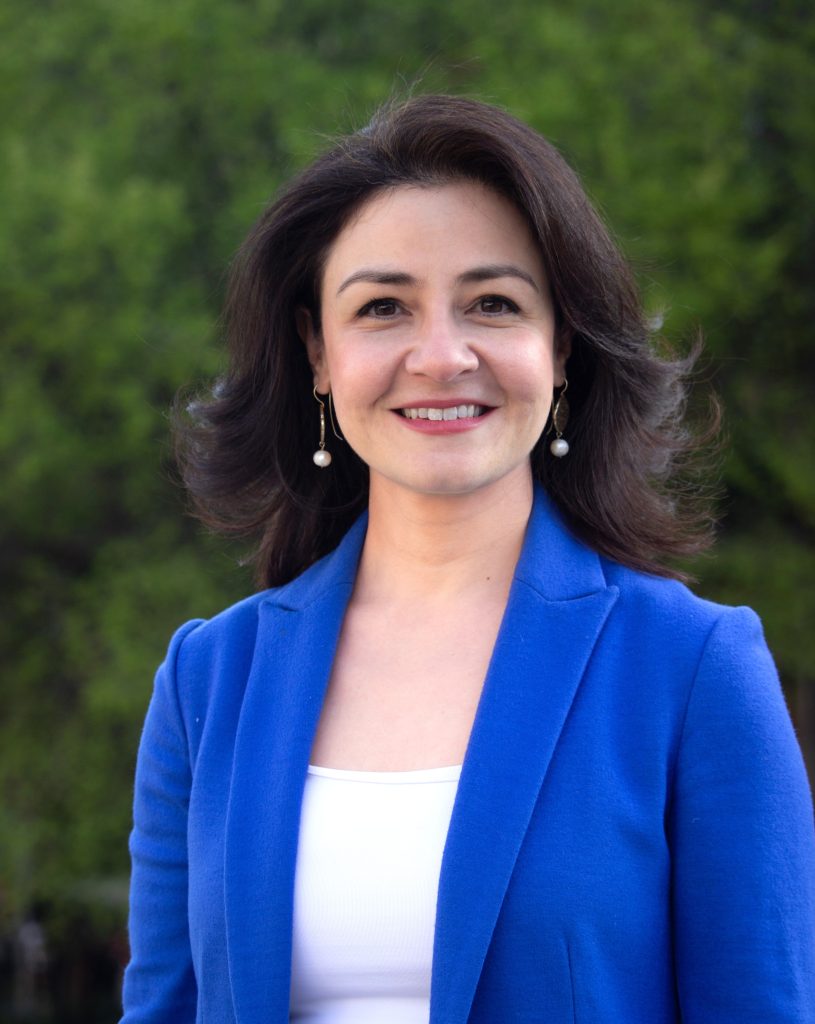
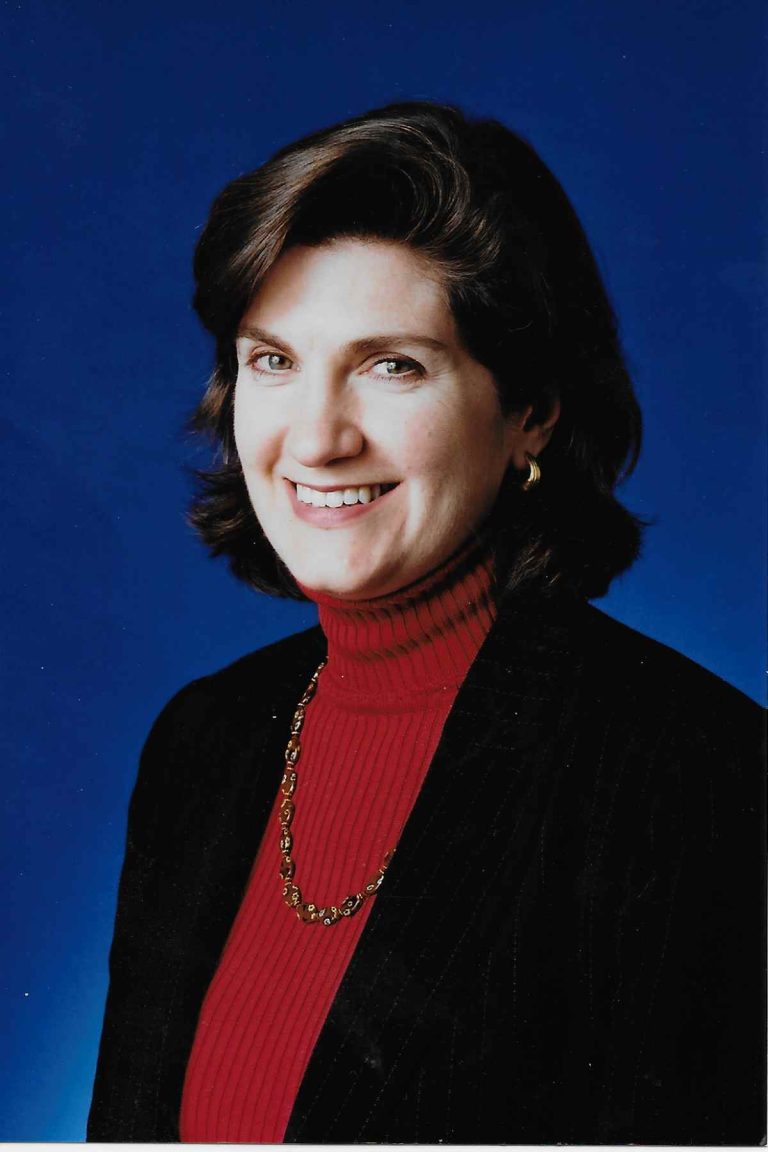
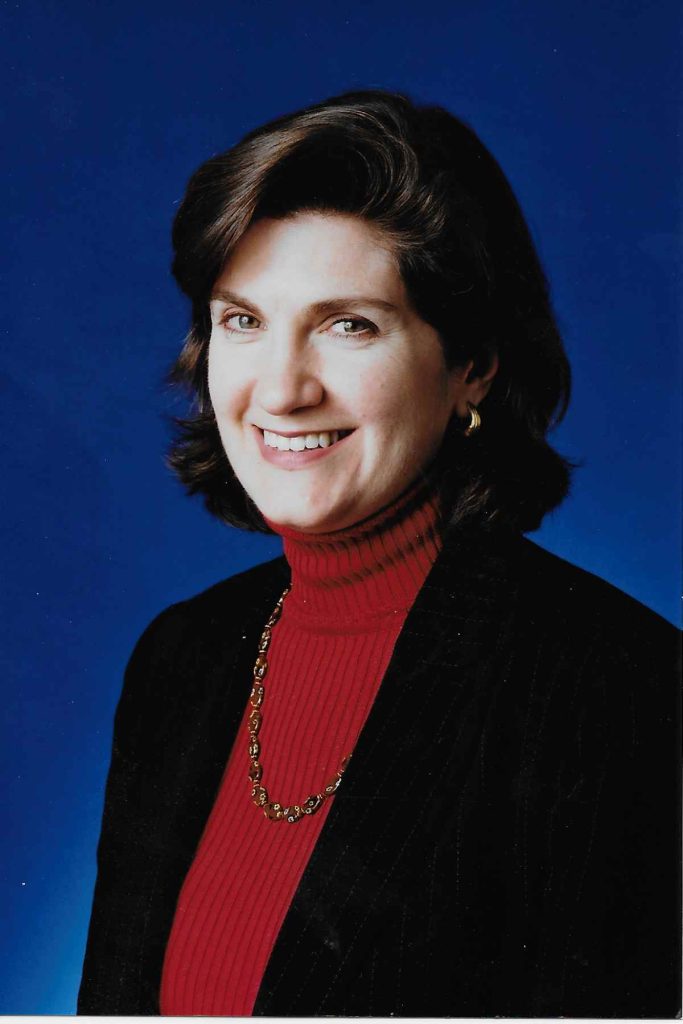
APRI Armenia Rules

We question our speakers and ourselves in order to create a respectful and evidence-based dialogue.
We aim to make continual progress and seek new solutions to the problems of the day.
Purposes of the APRI Rules:
- Priming our participants to exchange ideas, in line with our unique values and working model at APRI Armenia.
- Codifying and pushing forward our collective thinking.
- Moving away from polarization in order to center on solutions, balance, and critical thinking.
- Spreading our culture and energy as part of our contribution to the civic debate.
Artists in Residence

Artists in Residence
Step Band was founded in 2021 in the city of Stepanakert. After the 44-day war in 2020, trumpet player and composer Tigran Suchyan had been appointed leader of the Artsakh State Jazz Orchestra. In 2021 he invited several musicians from the orchestra to form a new band, naming it in honor of Stepanakert—Step Band.
Following the depopulation of Artsakh in 2023, the band began performing in Yerevan and now serves as the core of the Artsakh State Jazz Orchestra.
Step Band’s repertoire combines original compositions and jazz standards.
Photo Gallery



























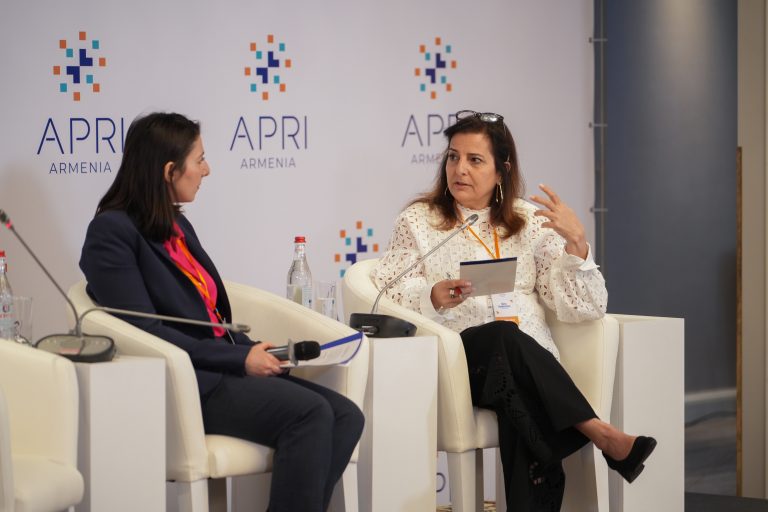
































Session Recordings
Sponsors



Supporters




